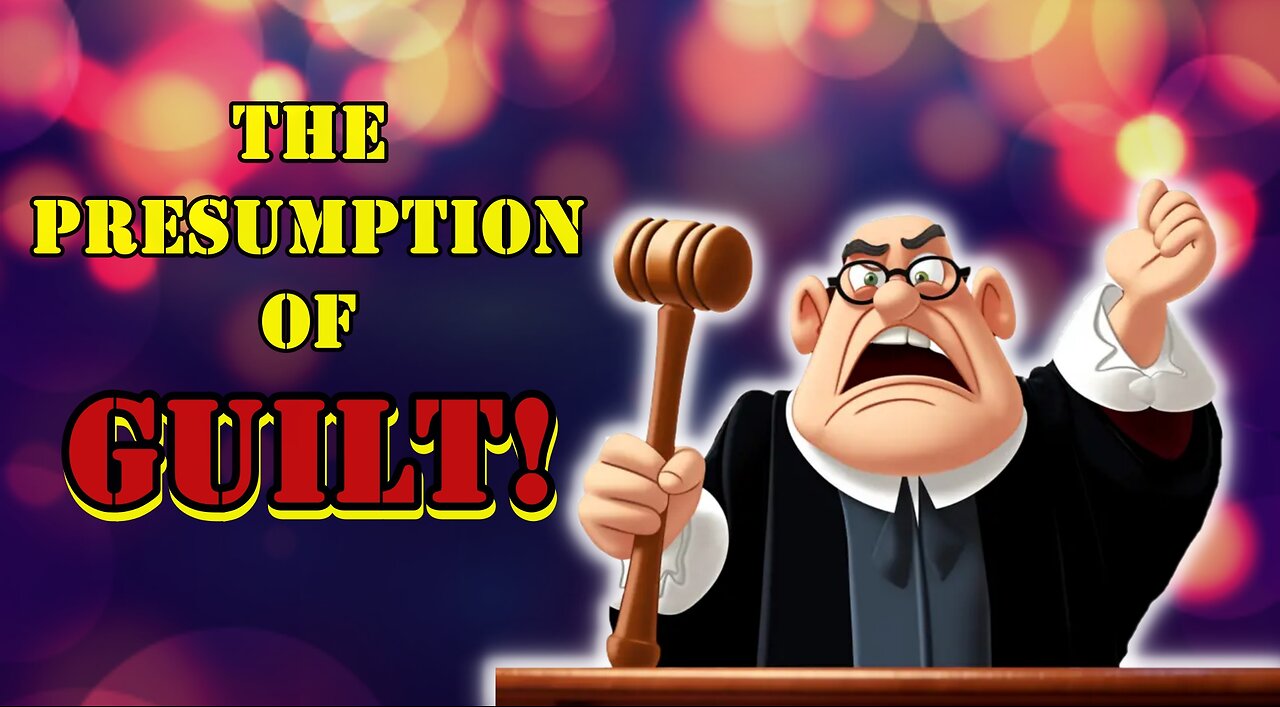Premium Only Content

12 Presumptions of LAW & How To BEAT IT
HOW DO YOU BEAT A CORRUPT LEGAL SYSTEM?
========================================================
Please consider supporting my channel
https://gofund.me/15b68437
https://www.paypal.com/paypalme/KrisBrooks
========================================================
Understanding the 12 Presumptions of Law: Demystifying the Legal System
Introduction:
In an era where knowledge is power, it is essential to understand the laws governing our society to protect our rights and ensure justice. However, despite countless legalities, many individuals unknowingly find themselves disadvantaged, assuming the role of a "pleb" – someone unaware of the law and deemed guilty as charged. This article aims to shed light on the 12 presumptions of law, explaining how the system operates and equipping you with the tools to fight against corruption and emerge victorious.
1. The Presumption of Guilt:
The first presumption we encounter within the legal system is the belief that individuals are guilty until proven innocent. As disconcerting as it may sound, this principle shifts the burden of proof onto the accused, requiring them to demonstrate their innocence.
2. The Presumption of Legal Autocracy:
Our legal system vests immense power in those who interpret and enforce laws. This presumption assumes that judges, prosecutors, and legal authorities inherently possess superior knowledge and authority, often disregarding the rights and perspectives of the accused.
3. The Presumption of Lack of Knowledge:
The system assumes that ordinary individuals, commonly referred to as "plebs," lack the knowledge and understanding of the intricate workings of the law. This presumption reinforces the gap between those in power and those seeking justice.
4. The Presumption of Ignorance:
Closely related to the presumption of lack of knowledge, this assumption suggests that individuals, unaware of their rights and the nuances of the law, can be easily manipulated and exploited by the system.
5. The Presumption of Consent:
This presumption operates under the assumption that individuals have implicitly consented to the jurisdiction of the laws and courts established by the governing authorities. Essentially, it assumes your agreement to be governed by the laws, even if not explicitly stated.
6. The Presumption of Incorporation:
This presumption asserts that all individuals automatically become subjects of the law, regardless of their awareness, consent, or willingness to participate in the legal system.
7. The Presumption of Government Authority:
Under this presumption, the government is considered the ultimate authority, with implicit power over its citizens. It assumes that the government's interests supersede individuals', making it challenging for the marginalized to challenge those in power.
8. The Presumption of Validity:
This presumption presupposes the legality and appropriateness of official acts, documents, and proceedings within the legal system. It places the burden on the accused to prove that a law or process is invalid or unconstitutional.
9. The Presumption of Infractions:
The system presumes that individuals have violated some aspect of the law, intentionally or unintentionally. This presumption enforces an environment where citizens are constantly under scrutiny and liable to be held accountable for potential transgressions.
10. The Presumption of Collaboration:
Not only does the legal system presume guilt, but it also insinuates that individuals associated with the accused share their guilt by association. This presumption often characterizes family members, friends, or colleagues as conspirators, creating a sense of fear within communities.
11. The Presumption of Accurate Legal Representation:
In an ideal legal system, every individual would receive adequate legal representation. However, this presumption assumes that appointed lawyers possess the requisite skills, competence, and dedication to secure justice for their clients, regardless of the realities they face.
12. The Presumption of Impunity:
Lastly, this presumption operates under the belief that those in positions of power, such as corrupt officials or well-connected individuals, can operate above and beyond the law with little to no consequence. It perpetuates a system that often shields the wealthy and influential from accountability while exploiting ordinary citizens.
Conclusion:
Understanding these 12 presumptions of law is the first step towards navigating the complex terrain of the legal system. Armed with this knowledge, individuals can empower themselves, challenge the status quo, and advocate for a more just society. By fighting against corruption and demanding transparency, we can hope for a system that truly safeguards our rights and upholds the principles of justice.
-
 2:45
2:45
LSB Film Productions
7 days agoThey REALLY Are Taking The P*SS!
70 -
 2:42:30
2:42:30
TimcastIRL
4 hours agoKash Patel CONFIRMED, Deep State PANICS, Mitch McConnell To RETIRE w/ Kevin Smith | Timcast IRL
107K194 -
 1:04:47
1:04:47
Candace Show Podcast
8 hours agoBecoming Brigitte: The Epilogue
77K108 -
 LIVE
LIVE
Alex Zedra
3 hours agoLIVE! Come Play WoT with me!
856 watching -
 LIVE
LIVE
Drew Hernandez
11 hours agoDOGE EXPOSES $2 BILLION SCHEME LINKED TO STACEY ABRAMS?!
2,745 watching -
 1:27:59
1:27:59
Kim Iversen
6 hours agoRFK Jr Declares No More Cheetos on Welfare? | Yale Confirms Long Covid Is Actually Vaccine Injury!
41.6K81 -
 1:08:43
1:08:43
The Charlie Kirk Show
4 hours agoTHOUGHTCRIME Ep. 74 — Charlie's Campus Return? Robo-Butlers? Garden of American Heroes?
46.8K12 -
 1:09:53
1:09:53
Slightly Offensive
4 hours ago $2.65 earnedIs the US Headed for MORE WAR Under TRUMP? | Guest: Scott Horton
22.9K8 -
 58:29
58:29
The StoneZONE with Roger Stone
4 hours agoRoger Stone Hails Confirmation of Kash Patel, Trashes Schiff for Attacks On Patel | The StoneZONE
29K10 -
 48:44
48:44
Man in America
9 hours agoA MASSIVE Global Financial Reset Is Coming—Are You Ready?
19.2K1